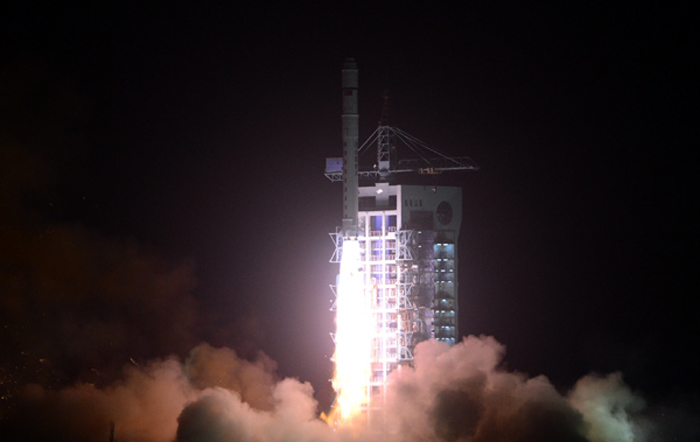-

A Long March carrier rocket carrying Turkish earth observation satellite GK-2 blasts off from the launch pad at the Jiuquan Satellite Launch Center in northwest China's Gansu Province, early on Dec. 19, 2012. China successfully sent the satellite GK-2 into orbit with a Long March carrier rocket on Wednesday.
.
A Turkish Earth observation satellite was successfully sent into space from northwest China early on Wednesday morning, marking the completion of this year's space launches.
A statement released by the Jiuquan Satellite Launch Center in northwest China's Gobi Desert said the Turkish satellite, the GK-2, was launched at 12:13 a.m. and was delivered into its predetermined orbit by a Long March 2D carrier rocket.
It marked the 174th flight of the Long March series of carrier rockets.
The State Administration of Science,Technology and Industry for National Defence said on Wednesday that this was the first time a Long March 2D carrier rocket had been used for such a launch on behalf of another country, marking a breakthrough for the entire Long March series in international commercial launching of low-earth-orbit satellites.
Also according to the administration, China's aerospace products' successful entry into the West Asia and North Africa markets will help the country expand its international market of commercial satellite launching services.
The launch of the Turkish satellite was based on a contract signed by the China Great Wall Industry Corporation (CGWIC) under the China Aerospace Science and Technology Corporation in May 2011.
The CGWIC is an organization authorized by the government to provide satellite in-orbit delivery, commercial launching and aerospace technology applications in China, according to the company's website.
The satellite, jointly developed by Turkey's Space Technologies Research Institute and Turkish Aerospace Industries, Inc., will mainly be used for environmental protection, mineral resource exploration, urban planning and disaster monitoring and management, according to the statement.
China successfully sent 28 satellites or spacecraft into space via 19 launches this year, it said, adding that the most significant achievement was seen in June with the country's first manned space docking maneuvers.
Next year, China will carry out a manned space docking test between orbiting target module Tiangong-1 and the Shenzhou-10 spacecraft. It will also send the Chang'e-3 moon probe into space, which is expected to land and stay on the moon in the second stage of the country's lunar probe program.
The country plans to send nearly 20 satellites into space in 2013.
Quelle: China-News
-
Gokturk-2, was launced from China
Turkey’s first indigenous high resolution Earth observation satellite Gokturk-2 was launched on Tuesday from China’s Jiuquan Satellite Launch Center and it was successfully put into orbit 686 km above the Earth’s surface. The first signals from the satellite was successfully received at a station in Norway’s Tromso at 19:39 Turkish local time.
Turkish Prime Minister and several Cabinet members attended a ceremony at the Space Technologies Research Institute of TUBITAK, Turkey’s scientific research agency, in Ankara.
The satellite which was manufactured by TUBITAK and the Turkish Aerospace Industries, will be used for the image requirements of the Turkish Armed Forces and as other institutions that require satellite images for agriculture, transportation and urban development with 2.5 meters of resolution.
The first images via the satellite are expected to be received at December 25-30.
Other than the optical camera which was bought from South Korea, all the other parts of Gokturk-2 was produced and manufactured in Turkey.
Launch date, which was earlier set for December 19, was shifted one day ahead due to adverse weather conditions.
Speaking at the ceremony, Prime Minister Erdogan said that the launching of the satellite had shown that Turkey was country that had a claim in the aerospace industry.
"The satellite we send to space today is a solid sign of the place that will power and self-confidence can carry Turkey," Erdogan said.
Also Speaking at the ceremony TUBITAK President Prof Yucel Altunbasak said the software of the satellite was entirely created by Turkish engineers and 80 percent of the hardware used in the satellite was manufactured in Turkey.
Gokturk-2 will not be subject to any international limitation in taking images and sending them to the stations.
Quelle: Turkish-Press
5961 Views
